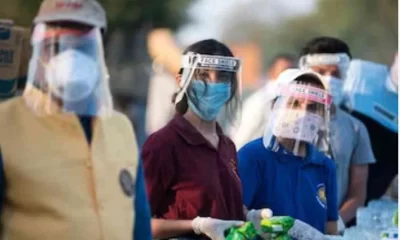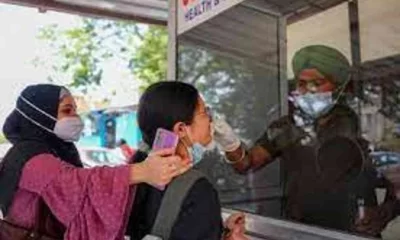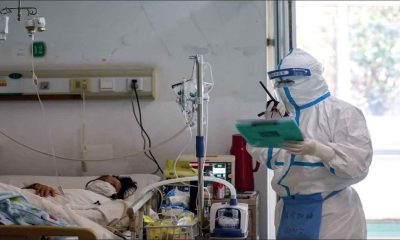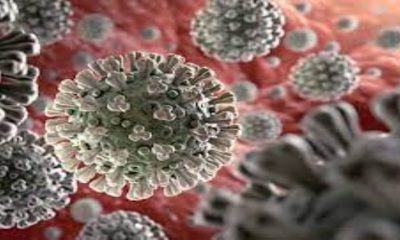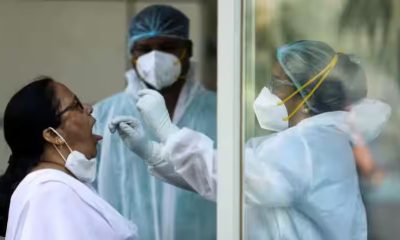Health
Covid-19: First Nasal spray, Nitric Oxide launches in India, here’s what you need to know
Recently, Glenmark, a global pharma company has launched the first nasal spray in India. It has been launched to treat Covid-19 in adults. It helps to create a physical barrier against Covid-19.

Covid-19 has affected lifestyle. Both adults and children are affected due to it. Recently, a global pharma company Glenmark has launched a nasal spray in India. The name of the spray is Nitric Oxide Nasal Spray (FabiSpray) in India. It has been launched in partnership with SaNOtize to treat Covid-19 in adults.
The manufacturing and marketing approval has been received from the India drug regulator, Drug Controller General of India by Glenmark for Nitric Oxide Nasal spray. It is part of the accelerated approval process.
How Nasal spray works?
According to the officials, Fabispray is made to kill the Covid-19 virus in the upper airways. It contains anti-microbial properties that directly impact the Covid-19 virus. When NONS sprayed overall nasal mucosa, it creates a physical and chemical barrier against the virus. It further prevents the virus from in=cubating and spreading o the lungs.
What has been said by the officials for this launch?
According to the Glenmark officials, they are confident enough about his nasal spray. This spray provides patients with a much-needed and timely therapy option. They said that they are a leading pharmaceutical player in the market. It is a vital part of India’s fight against Covid-19. They are elated that they had received the regulatory approval for Nitric Oxide Nasal Spray. They are going to launch it in partnership with SaNotize.
As per Dr. Monika Tandon, Senior VP and Head of Clinical Development in Glenmark Pharmaceuticals Ltd, demonstration of a reduction in the viral load has an important positive impact from a patient and community perspective. In the present scenario, with new emerging variants exhibiting high transmissibility, NONS provides a useful option in the fight against COVID-19 in India.
She also added that according to the studies conducted in the Utah State University USA, NONS is proven to kill 99.9 percent of SARS-Cov-2 virus including Alpha, Beta, Gamma, Delta, and Epsilon variants within 2 minutes.
Health
India registers 313 new Covid cases, active cases reach 2,041, 3 deaths recorded in last 24 hours
The currently available data suggests that the JN.1 variant is neither leading to an exponential rise in the new cases nor a rise in the hospitalization and mortality.
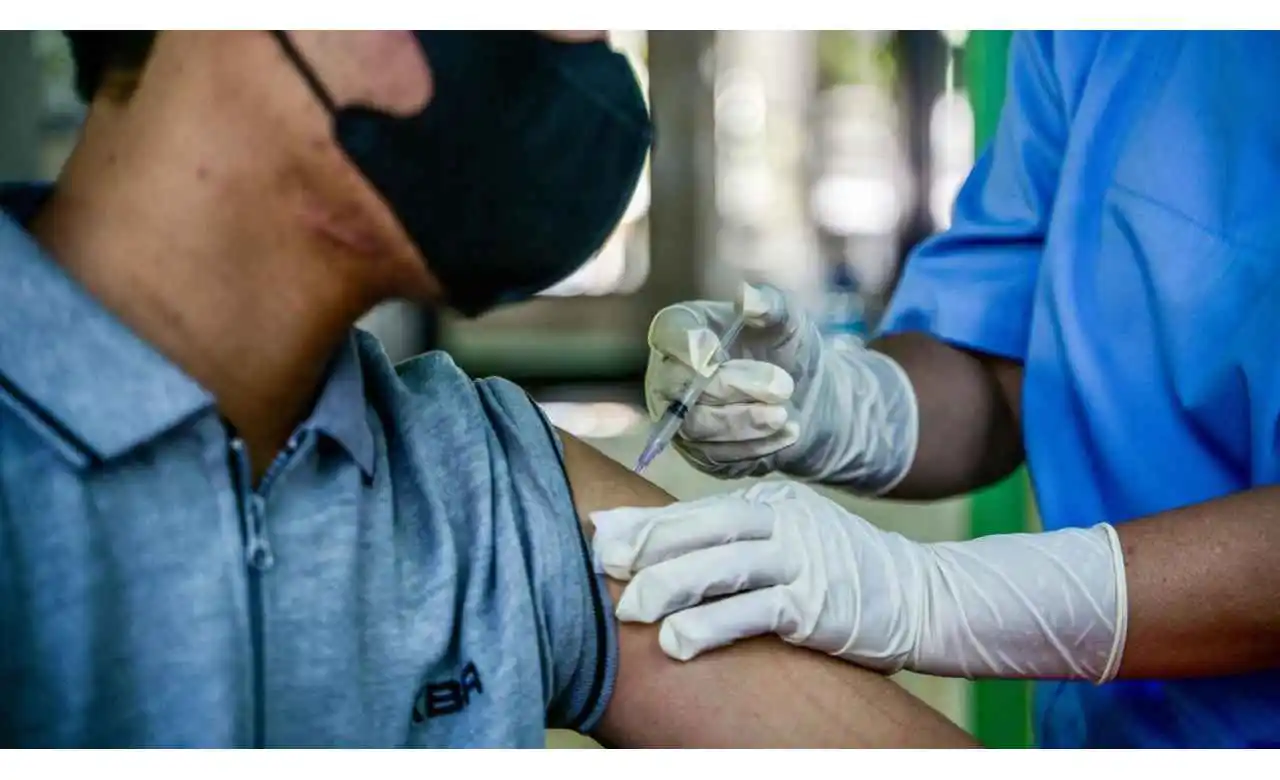
India saw a single-day rise of 313 new Covid cases, while the active caseload has declined to 2,041, the health ministry said on Saturday. Three deaths: two from Karnataka and one from Maharashtra were reported in the last 24 hours.
According to the ministry website, the number of active cases in the country stood at 2,331 on Friday. The number of cases of Covid had dropped to double digits till December 5, but it began to start increasing after the emergence of a new variant and cold weather conditions.
According to reports after December 5, the highest single day rise of 841new cases was reported on December 31, 2023, which is 0.2% of the peak cases reported in May 2021. Of the total active cases, a large majority of these (around 92%) are recovering under home isolation.
The currently available data suggests that the JN.1 variant is neither leading to an exponential rise in the new cases nor a rise in the hospitalization and mortality. India has witnessed three waves of Covid in the past with its peak incidence of daily new cases and deaths being reported during the delta wave in April June 2021.
At its peak, 414,188 new cases and 3915 deaths were reported on May 7, 2021. Since the pandemic started in early 2020, there have have been 4.5 crore people who have got infected and this has resulted in the death of 5.3 lakh persons in a total time span of four years.
According to the ministry data, the total number of persons who have recuperated from the disease are 4.4 crore with total recovery rate recorded is 98.81%. A total number of 220.67 crore doses of Covid vaccines have been administered in India so far.
Health
India registers 605 new COVID-19 cases and 4 deaths in last 24 hours
The number of people who have recovered from the disease has gone up to 4,44,81,341, an increase of 648 since Sunday morning. In Kerala a 70 year-old male with chronic obstructive pulmonary disease (COPD) and 81year-old male with T2DM and HTN, and in Karnataka, a 48 year old male with CA and TB died, while one person in Tripura succumbed to COVID.
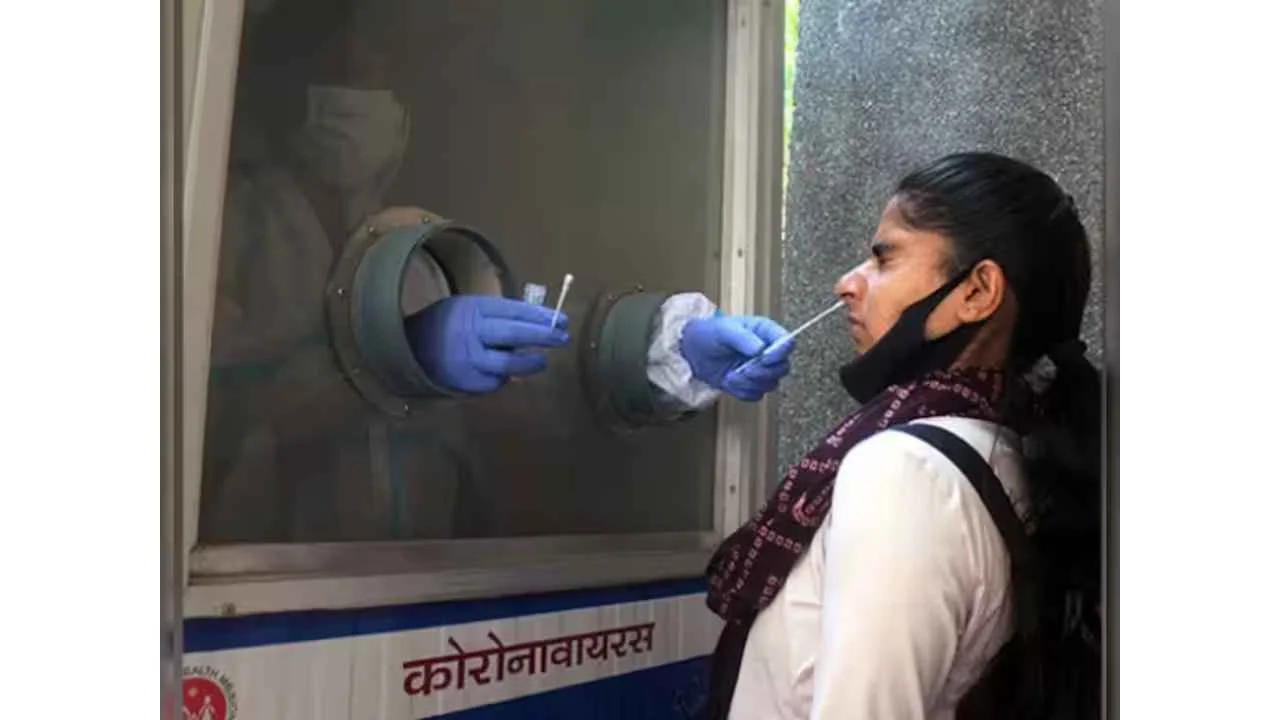
India recorded 605 fresh COVID-19 cases and four deaths in the last 24 hours. The active cases have increased to 4002, while India’s overall COVID case tally stands at over 4.5 crore (4,50,18,792). The death toll was recorded at 5,33,396 with four new deaths – two from Kerala and one each in Karnataka and Tripura – reported in the last 24 hours, the data updated at 8am stated.
The number of people who have recovered from the disease has gone up to 4,44,81,341, an increase of 648 since Sunday morning. In Kerala a 70 year-old male with chronic obstructive pulmonary disease (COPD) and 81year-old male with T2DM and HTN, and in Karnataka, a 48 year old male with CA and TB died, while one person in Tripura succumbed to COVID.
The Indian Council of Medical Research (ICMR) reported that 11,838 doses of the vaccine had been administered in the country till January 7. The data is a compilation of the Integrated Disease Surveillance Programme (National Centre for Disease Control), media bulletins and websites of various states at 8am on January 4.
As the winter season sets in, health experts are highlighting a sudden surge in viral infections, influenza, and COVID-19 cases. Dr Nikhil Modi, a senior pulmonologist at Indraprastha Apollo Hospital, pointed out that the decrease in temperature leads to increase in moisture in the air, low wind speed and also causes an increase in pollution levels. This contributes highly to various infections.
Due to the decrease in temperature the fog combines with the pollution in the air which further leads to the formation of smog. This condition of the atmosphere can cause different types of infections and difficulty in breathing. Both the state and the central government are keeping a close watch on the new Omicron Subvariant JN.1. J.N.1 is a Variant of Interest (VOI) which is under intense scientific scrutiny.
Health
India records 774 new Covid-19 cases, 2 deaths in 24 hours
The number of daily cases was in double digits till December 5 but it started to rise again amid cold weather conditions and after the emergence of new Covid-19 variant, JN.1.
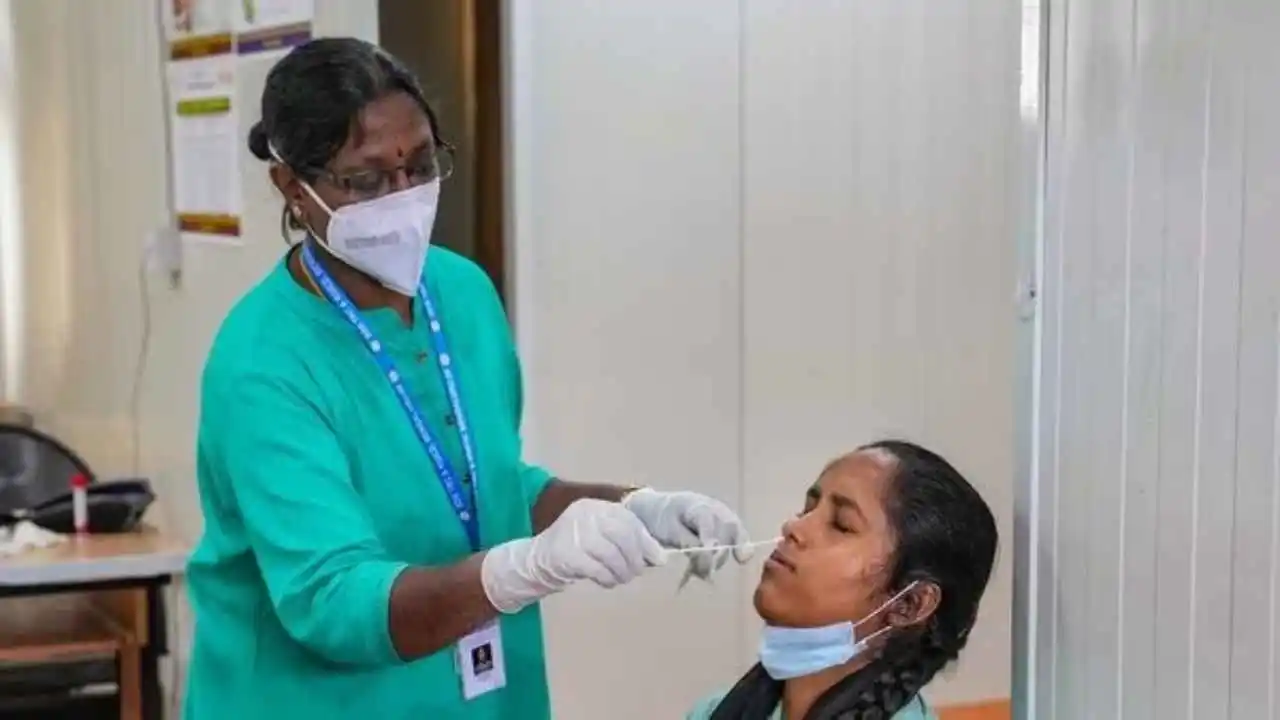
India on Saturday had a single-day rise of 774 Covid cases while the number of active cases stood at 4,187, the Union health ministry said. As many as two deaths – one each from Tamil Nadu and Gujarat were reported in a span of 24 hours. Of the 4,187 active cases, the majority (over 92%) are recovering under home isolation.
The number of daily cases was in double digits till December 5 but it started to rise again amid cold weather conditions and after the emergence of new Covid-19 variant, JN.1. The central government has asked the state government and union territories to maintain a constant vigil amid an upward trend in the number of Covid-cases and the detection of the JN.1 sub variant in the country.
According to reports after December 5, the highest single-day rise of 841 cases was reported on December 31, 2023, which was 0.2% of the peak cases reported in May 2021. A health official said that the JN.1 variant is neither leading to an exponential rise in new cases nor a surge in hospitalisation and mortality in the country.
The Karnataka government has made the Covid test mandatory for those with Influenza like illness (ILI) or Severe Acute Respiratory Illness (SARI). Karnataka Health Minister Dinesh Gundu Rao said more than 7000 tests are being done every day and the COVID positivity rate is 3.82%. The positivity rate in the state has not come down yet.
He said those with symptoms are being monitored and tested. Those who are in isolation at home have been told to take extra care. He added it is expected that the trend of decreasing Covid cases may start next week in Karnataka. India has witnessed three waves of Covid-19 in the past with the peak incidence of daily cases and deaths being reported during the Delta wave during April-June 2021. At its peak 4,14,188 cases and 3915 deaths were reported on May 7, 2021.
-

 Cricket news10 hours ago
Cricket news10 hours agoIPL 2024: Lucknow Super Giants beat Chennai Super Kings by 8 wickets
-

 2024 Lok Sabha Elections9 hours ago
2024 Lok Sabha Elections9 hours agoPrime Minister Narendra Modi takes dig at Rahul Gandhi, says like Amethi, Congress will lose its ground from Wayanad also
-

 India News5 hours ago
India News5 hours agoAAP leader Saurabh Bharadwaj says a conspiracy is underway for slow death of Arvind Kejriwal
-

 2024 Lok Sabha Elections8 hours ago
2024 Lok Sabha Elections8 hours agoRJD leader Tejashwi Yadav says BJP’s 400 paar film has become a super flop on the first day itself
-

 2024 Lok Sabha Elections7 hours ago
2024 Lok Sabha Elections7 hours agoRahul Gandhi says BJP will not get more than 150 seats in Lok Sabha elections
-

 Education2 hours ago
Education2 hours agoSuper 30 founder Anand Kumar has heartwarming encounter with ex-student in USA, post goes viral
-

 Entertainment4 hours ago
Entertainment4 hours agoBollywood star Ajay Devgn shares emotional birthday post on his daughter Nysa Devgan’s 21st birthday



